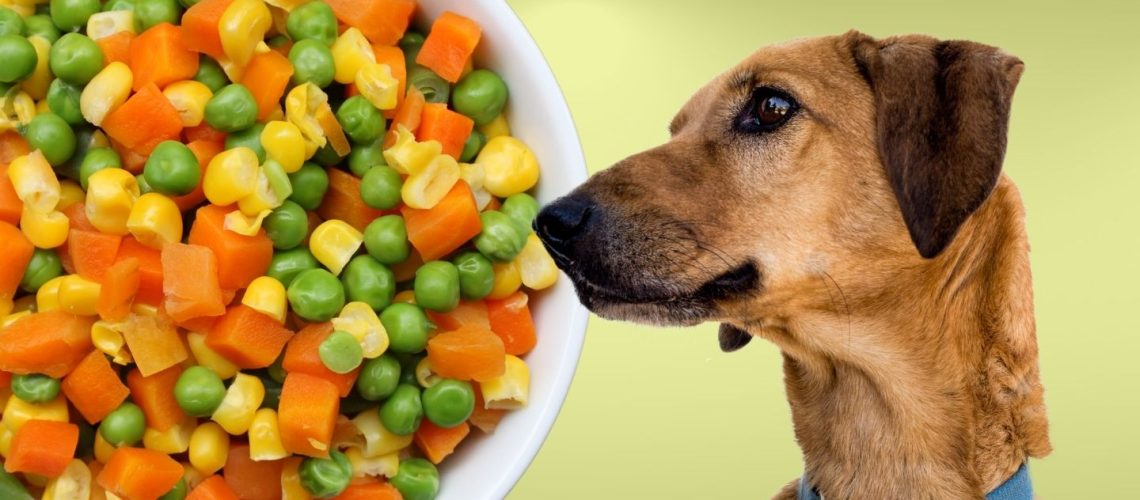The short answer is yes, dogs can eat mixed vegetables in moderation. Mixed vegetables are a healthy and nutritious snack for dogs, as long as they are cooked and do not contain any harmful ingredients. A balanced diet is essential for your dog's overall health, and understanding their nutritional needs is crucial. Including certain mixed vegetables in your dog's meals can provide added health benefits, but it's important to know which vegetables are safe and how to properly serve them.
Types of mixed vegetables dogs can eat
Broccoli
Benefits for dogs
Broccoli is a nutrient-rich vegetable that can provide dogs with vitamins C, K, and A, as well as fiber, potassium, and iron. It can help boost immunity, support digestion, and promote a healthy coat.
Serving suggestions
Serve broccoli to your dog in small, bite-sized pieces, steamed or boiled without any seasonings or oils.
Carrots
Benefits for dogs
Carrots are an excellent source of vitamin A, which can improve your dog's vision and promote a healthy immune system. They also provide fiber, potassium, and vitamin C.
Serving suggestions
You can feed your dog cooked or raw carrots, but make sure they are cut into appropriate-sized pieces to prevent choking.
Green Beans
Benefits for dogs
Green beans are low in calories and high in fiber, making them a great snack for dogs needing to lose weight. These beans also provide vitamins C and K, as well as magnesium and potassium.
Serving suggestions
Green beans can be served cooked or raw, but it's best to avoid using seasonings or oils. Cut them into smaller pieces to make it easier for your dog to eat.
Peas
Benefits for dogs
Peas are a good source of vitamins A, K, and C, as well as protein and fiber. They can help support a healthy immune system and digestion.
Serving suggestions
Feed your dog cooked or thawed frozen peas without any seasonings or additives.
Spinach
Benefits for dogs
Spinach is rich in vitamins A, K, and C, as well as minerals like iron and calcium. It can help support a strong immune system and maintain healthy bones and muscles.
Serving suggestions
When feeding spinach to your dog, make sure it is cooked and finely chopped. Avoid serving it raw, as it can be difficult to digest.
Sweet Potatoes
Benefits for dogs
Sweet potatoes are high in fiber and rich in vitamins A, C, and B6, providing health benefits such as improved digestion and a stronger immune system.
Serving suggestions
Serve cooked and mashed sweet potatoes to your dog without any added seasonings or sweeteners.
Vegetables to avoid for dogs
Asparagus
Reasons to avoid
Asparagus can be difficult for dogs to digest and may cause gas and bloating. It offers little nutritional benefit for dogs and can be a choking hazard.
Onions and Garlic
Reasons to avoid
Onions and garlic contain compounds that can be toxic and cause anemia in dogs. It is best to avoid feeding any food containing these ingredients.
Mushrooms
Reasons to avoid
Some mushrooms may be toxic to dogs, and it's not always easy to distinguish between safe and harmful mushrooms. To be safe, avoid feeding your dog any type of mushroom.
Tomatoes
Reasons to avoid
Tomatoes contain solanine, which can be toxic to dogs if consumed in large quantities. It is best to avoid giving your dog any tomato-based products.
How to prepare mixed vegetables for dogs
Cooking methods
Steaming
Steaming vegetables is a great way to retain their nutrients and make them easier for dogs to digest.
Boiling
Boiling vegetables can also make them easier to digest, but some nutrients may be lost in the process.
Baking
Baking vegetables is another option, but avoid using any oils or seasonings that may be harmful to your dog.
Seasoning and additives to avoid
Salt
Too much salt can be harmful to dogs and may lead to excessive thirst or even poisoning.
Artificial sweeteners
Artificial sweeteners, especially those containing xylitol, can be toxic to dogs and should be avoided.
Spices
Many spices may be harmful to dogs, so it is best to serve vegetables plain or with minimal, dog-friendly seasonings.
Incorporating mixed vegetables into dog meals
Homemade dog food recipes
Include cooked mixed vegetables in homemade dog food recipes to add variety and nutrition to their diet.
Store-bought mixed vegetable dog treats
Purchase dog treats that contain mixed vegetables and are specifically formulated for dogs to ensure they are safe and nutritious.
Monitoring your dog's health
Signs of digestive upset
Gas
Bloating
Diarrhea
If your dog experiences any of these symptoms after eating mixed vegetables, reduce the quantity or discontinue feeding them altogether.
Allergic reactions in dogs
Symptoms to watch for
Allergic reactions may include itching, hives, swelling, or difficulty breathing.
What to do if your dog has an allergic reaction
Consult your veterinarian immediately if your dog shows signs of an allergic reaction to any food.
Expert opinions on feeding mixed vegetables to dogs
Veterinarians' recommendations
Always consult your veterinarian before introducing new foods into your dog's diet. They can provide guidance on the appropriate types and amounts of vegetables to feed.
Dog nutritionists' advice
Seek advice from a qualified dog nutritionist to ensure you are providing your dog with a balanced diet that meets their specific needs.
Frequently Asked Questions
How much mixed vegetables can I give my dog?
The quantity of mixed vegetables to feed your dog will depend on their size, age, and activity level. Consult your veterinarian for guidance on appropriate amounts.
Can puppies eat mixed vegetables?
Yes, but it's essential to introduce them slowly and in small quantities to avoid digestive upset. Always consult your veterinarian before adding new foods to a puppy's diet.
What other human foods can dogs eat safely?
Dogs can safely consume various human foods, such as lean meats, brown rice, and certain fruits like apples and blueberries. Always research a food's safety before feeding it to your dog and consult your veterinarian for recommendations.











